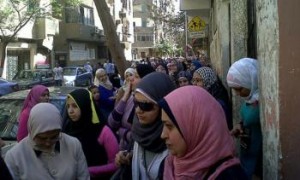What YES on the Referendum Really Means
Posted on: April 27, 2012, by : Editor In the first vote following the overthrow of Hosni Mubarak, Egypt’s long-standing president, an overwhelming 77 percent of voters, nearly 14 million out of 18.5 million who participated at the polls, voted “yes” on a package of nine proposed amendments. While there is continued debate on the results and their potential impact, one element is certain: the referendum last Saturday served as a strong representation of Egypt’s movement forward to inclusion of real, democratic processes in deciding its political future.
In the first vote following the overthrow of Hosni Mubarak, Egypt’s long-standing president, an overwhelming 77 percent of voters, nearly 14 million out of 18.5 million who participated at the polls, voted “yes” on a package of nine proposed amendments. While there is continued debate on the results and their potential impact, one element is certain: the referendum last Saturday served as a strong representation of Egypt’s movement forward to inclusion of real, democratic processes in deciding its political future.
At the polls, Egyptian voters, including many women, some of whom were voting for the first-time ever, waited patiently in line. There were few reports of commotion, though some discrepancies in polling practices were submitted. Accounts emphasized the eagerness of citizens to participate in the vote and exercise their democratic right to approve or disapprove the amendments.
The referendum also demonstrated the effect of aggressive campaigning by established parties. Groups such as the Muslim Brotherhood and the NDP were extremely organized and worked hard to promote the message to approve the amendment package. This effort included plastering posters across Egyptian neighborhoods and media campaigns. In attending the polls, it was clear that many were voting for the purpose of continuing to “move Egypt forward” and quickly return it to civilian rule. Voters were less certain about how the referendum results might impact their own rights or Egypt’s long-term political progress.
Meanwhile, the opposition pushed for a “no” vote but took limited actions to reach large constituencies of voters. If the amendments had been rejected, elections might have been delayed until at least December or a time when the committee could’ve proposed a completely new constitution, which is what many of those who ignited the revolution truly hoped for. Some have gone as far as to call the current constitution a “dictator’s constitution.”
Most of the opposition and many of its most visible activists, including Amr Moussa, the outgoing Arab League chief, Mohamed El Baradei, and the Revolution Youth Coalition urged for cancellation of the referendum, citing that the amendments did not do enough to limit the powers of the president. Moreover, the amendments were required to be approved or rejected as one entity and were not separately considered, causing those who agreed with most of the amendments to vote for the passing of all of them. A few measures were taken to spread the word, including “Say no,” a video which was circulated on YouTube and featured Amr Moussa, however, it appears that this did not go far enough in reaching more marginalized groups or convincing those who feared continued military rule or prolonged instability to await a new constitution. The need for greater lobbying and debate, highlighted through more widespread media campaigns, was clearly demonstrated.
A core issue that was on the table at the polls and has subsequently been approved is the timing of the parliamentary and presidential elections, which will be held in September and December respectively. By holding the elections sooner, there will be less time for new parties to emerge out of the revolution and build constituencies and platforms in response to expressed human rights and economic priorities. A shorter lag time before the election will only reinforce the power of established parties and powers. These groups count on votes from a core constituency that they’ve built over the years, they have data and research on who their supporters are and how to best reach them, they are logistically and administratively organized and are savvy and experienced regarding elections and campaigning, and they have more financing than the grassroots or youth parties which are just beginning to develop and gain strength.
Ultimately, it appears that the change demanded for Egypt is still largely undefined. The need for more discussion, debate, and media attention on core issues will play a pivotal role in determining what’s next for the people of Egypt.
Image courtesy of monasosh under a Creative Commons License.
